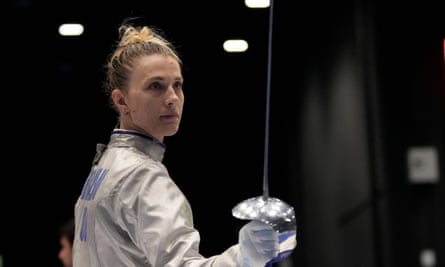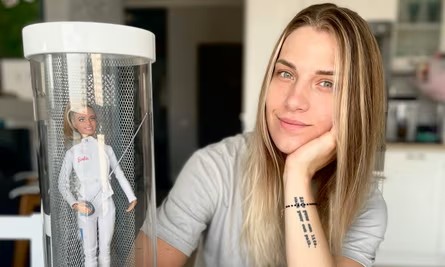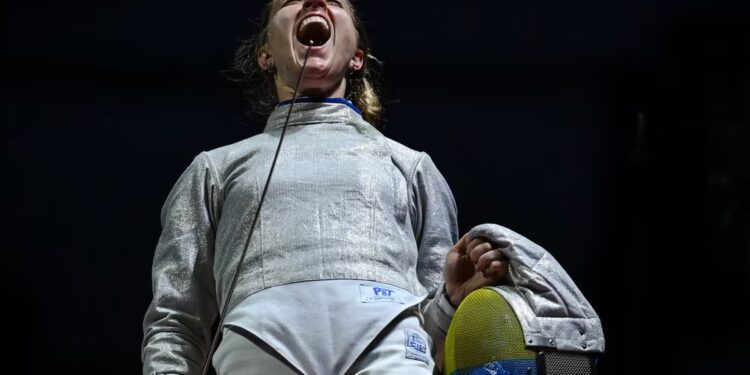Olha Kharlan remembers taking her kit, sitting quietly in a side room and contemplating a future without the sport she loves. It all seemed so nonsensical. She had been disqualified from the fencing world championships in Milan for not shaking hands with her Russian opponent, Anna Smirnova, and the price for exercising a point of principle had soared beyond all expectation.
“I thought that was it, this was how my career would end,” she says. “I accepted it, I believed it was over. I had to think the worst. Right there, I felt in the worst condition of all my life.”
Common sense prevailed to an extent. Kharlan is one of Ukraine’s sporting heroes, an Olympic gold medallist who stands alongside figures such as Oleksandr Usyk and Andriy Shevchenko in a young country’s post-independence pantheon. Her ejection had made qualification for Paris 2024 by the standard route virtually impossible but an intervention from the International Olympic Committee president, Thomas Bach, a former fencer, guaranteed her a place next summer. The short-term future remains unclear but at least someone had recognised the collective trauma endured by millions of Ukrainians.

“I got a lot of hate for what I did,” she says of a predictably depressing online reaction. “But people who talk like this don’t understand what war means. Unfortunately, I do and so does every other Ukrainian athlete. We play sports but we are citizens of Ukraine, fighting for our country in different ways. We have a straight position about it: that we have to show the world what is happening, because not everybody understands us.”
It should not be difficult to comprehend what led Kharlan to reject the handshake after defeating Smirnova, instead offering to touch sabres. She recalls the “hell” of those first few weeks after Russia’s invasion in February 2022: the jeopardy of taking her sister and nephew from Ukraine to her home in Italy and the constant fear for her parents, who chose to stay in their under-fire home city, Mykolaiv.
Competing normally was out of the question. “I couldn’t find myself on the strip, couldn’t find my fencing, you just can’t be focused that much,” she says of her form last year. Mykolaiv was still being attacked last June as she prepared for the European championships in Antalya. “There were about 50 rockets fired there the day before. The next day I had to fence and it was the worst feeling. I started to press upon my family to leave: ‘Please go, if you love me please go.’ But they refused to, unless the Russians occupied the city.
“It’s still the same: you’re going to competitions and checking the news constantly, it becomes a regular habit. Dnipro, Vinnytsia, Uman, updates from everywhere. Time passes and, unfortunately, you just get used to it. I did a lot of work with my psychologist to accept the situation, to understand what I can do for my country, my family and for myself. It took some time. When I won a bronze medal in Tunisia in January, my first since the war, it was the most valuable of my life. I cried my eyes out.”

Such intensive conditioning was compromised when she discovered Smirnova lay ahead. Russians and Belarusians, previously banned by the IOC, had controversially been allowed to compete as neutrals since March bu Kharlan was the first athlete officially representing Ukraine to face an opponent from either country since the invasion. “I found out three days before the tournament,” she says. “I couldn’t believe it was happening. I was the only Ukrainian, she the only Russian, and we had to fight each other. I thought it was strange but told myself not to think about it like that: I had to do my work, had to win, had to get my emotions together.
“Our ministry of sport only confirmed we could compete against Russians the day before. I spoke to my family, my coach, my psychologist, everyone, all in 24 hours before the fight. I had to figure it out very fast. I wasn’t quite panicking, but I became really nervous. All the pressure and emotions felt too much for me but I thought: ‘You just have to go through this and then it’ll be better, it’ll be OK.’”
It was a triggering, deeply uncomfortable position to navigate. Kharlan had already decided that, in any such situation, she would keep interaction with her adversary to a minimum. Handshakes are compulsory under International Fencing Federation (FIE) rules; she had been given conflicting advice whether any penalty would be imposed for merely tipping blades, which had become standard practice under Covid-19 protocols, but had no intention of giving the Russians any oxygen to make a triumph of the encounter. After winning, she extended her sabre but instead of reciprocating Smirnova staged a sit-in protest on the piste for 50 minutes.

Had the Russian camp decided to implicate her on purpose? “I think they wanted to use the handshake as a mark of peace, no politics in sport, everything like that. For them it was really important to take pictures and videos of it, to prove Russia and Ukraine are together. But it didn’t go to their plan, because I had no other plan at all.
“Nobody can force me or Ukraine into peace: you can’t just say it, you have to do it. I see how our defenders are fighting for the nation and can’t show that I appreciate this other country’s representative.
“I was OK to fight, to propose the Covid protocol, I wanted to do it. I told her I would not shake hands with her: nothing bad was said, it was all very professional and straight. I knew the moment about the handshake would come, so of course I prepared myself, but I couldn’t prepare for her reaction and for everything that followed.”
Source: The Guardian



Recent Comments